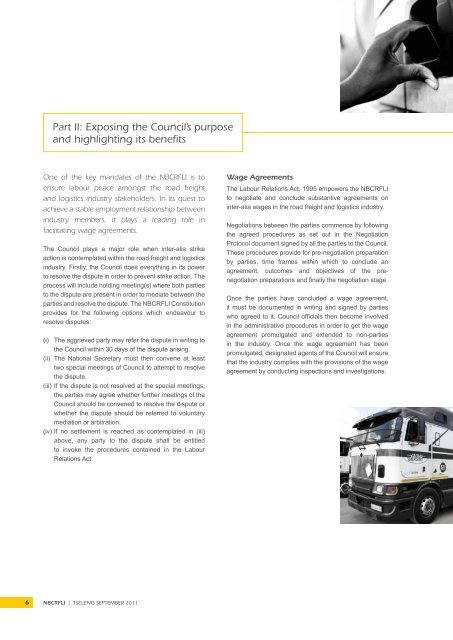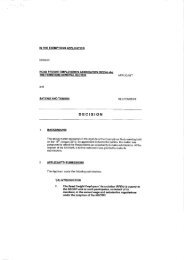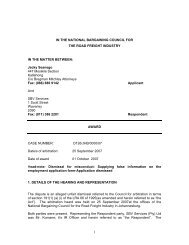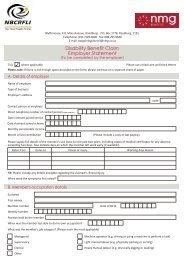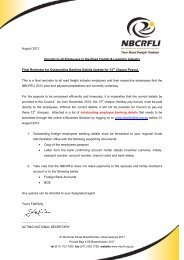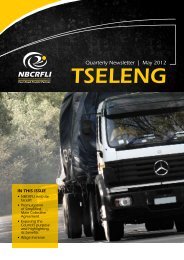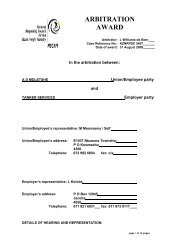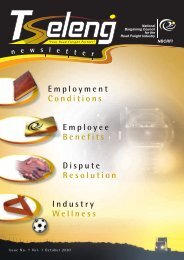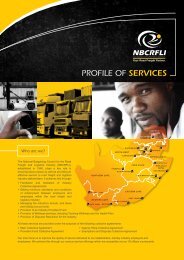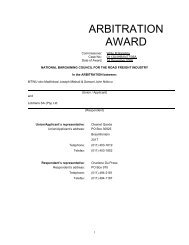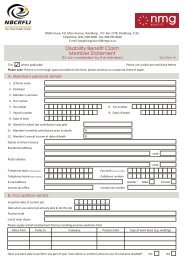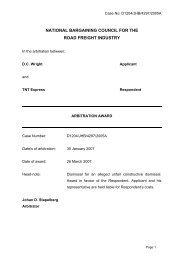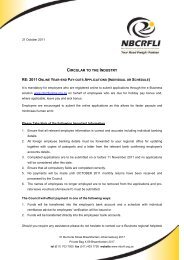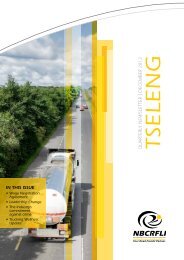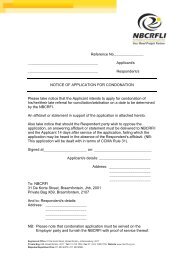Tseleng September 2011 - nbcrfli.org.za
Tseleng September 2011 - nbcrfli.org.za
Tseleng September 2011 - nbcrfli.org.za
Create successful ePaper yourself
Turn your PDF publications into a flip-book with our unique Google optimized e-Paper software.
Part II: Exposing the Council’s purpose<br />
and highlighting its benefits<br />
One of the key mandates of the NBCRFLI is to<br />
ensure labour peace amongst the road freight<br />
and logistics industry stakeholders. In its quest to<br />
achieve a stable employment relationship between<br />
industry members, it plays a leading role in<br />
facilitating wage agreements.<br />
The Council plays a major role when inter-alia strike<br />
action is contemplated within the road freight and logistics<br />
industry. Firstly, the Council does everything in its power<br />
to resolve the dispute in order to prevent strike action. The<br />
process will include holding meeting(s) where both parties<br />
to the dispute are present in order to mediate between the<br />
parties and resolve the dispute. The NBCRFLI Constitution<br />
provides for the following options which endeavour to<br />
resolve disputes:<br />
(i) The aggrieved party may refer the dispute in writing to<br />
the Council within 30 days of the dispute arising.<br />
(ii) The National Secretary must then convene at least<br />
two special meetings of Council to attempt to resolve<br />
the dispute.<br />
(iii) If the dispute is not resolved at the special meetings,<br />
the parties may agree whether further meetings of the<br />
Council should be convened to resolve the dispute or<br />
whether the dispute should be referred to voluntary<br />
mediation or arbitration.<br />
(iv) If no settlement is reached as contemplated in (iii)<br />
above, any party to the dispute shall be entitled<br />
to invoke the procedures contained in the Labour<br />
Relations Act.<br />
Wage Agreements<br />
The Labour Relations Act, 1995 empowers the NBCRFLI<br />
to negotiate and conclude substantive agreements on<br />
inter-alia wages in the road freight and logistics industry.<br />
Negotiations between the parties commence by following<br />
the agreed procedures as set out in the Negotiation<br />
Protocol document signed by all the parties to the Council.<br />
These procedures provide for pre-negotiation preparation<br />
by parties, time frames within which to conclude an<br />
agreement, outcomes and objectives of the prenegotiation<br />
preparations and finally the negotiation stage.<br />
Once the parties have concluded a wage agreement,<br />
it must be documented in writing and signed by parties<br />
who agreed to it. Council officials then become involved<br />
in the administrative procedures in order to get the wage<br />
agreement promulgated and extended to non-parties<br />
in the industry. Once the wage agreement has been<br />
promulgated, designated agents of the Council will ensure<br />
that the industry complies with the provisions of the wage<br />
agreement by conducting inspections and investigations.<br />
6<br />
NBCRFLI | TSELENG SEPTEMBER <strong>2011</strong>


